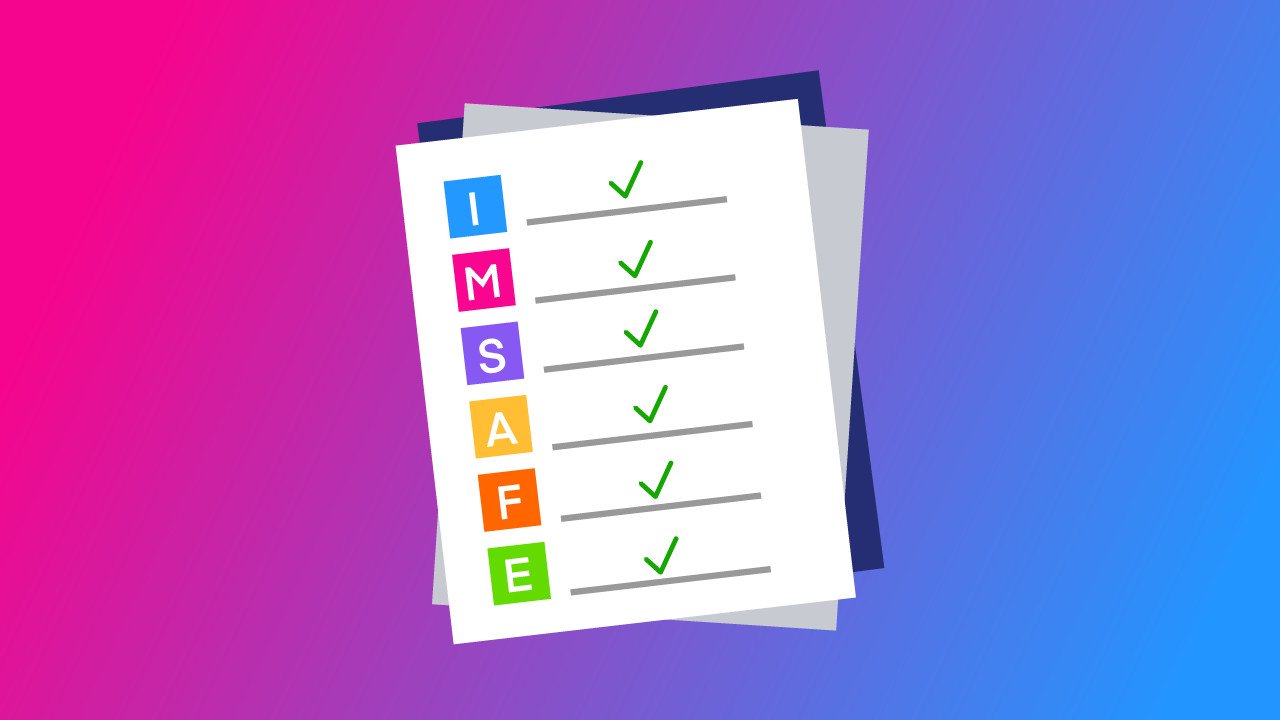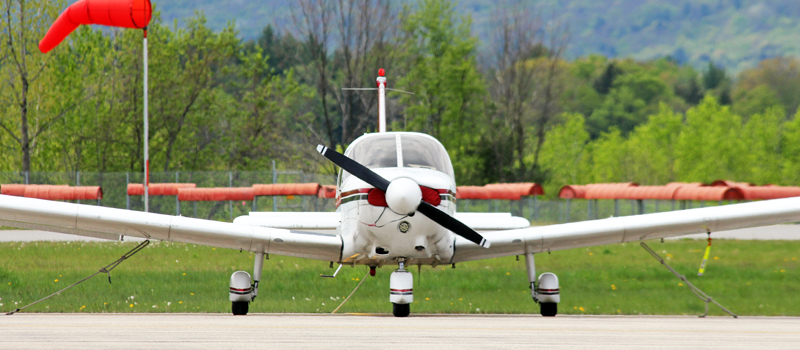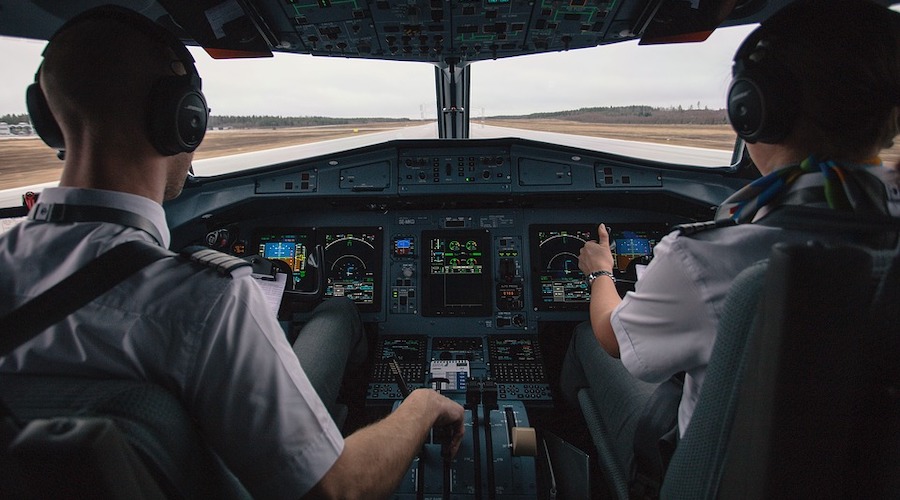Aviation professionals use IMSAFE as an acronym to help pilots assess their physical and mental fitness before a flight.
IMSAFE is used as a “self-check” to make sure that you, the pilot, are as ready to fly as the aircraft is.
Ultimately, the safety of a flight is only as good as its weakest link. With a significant amount of accidents caused by pilot error every year, pilots must ensure they are physically and mentally fit to fly.
Key Takeaways
- IMSAFE helps pilots evaluate their readiness to fly.
- It assesses Illness, Medication, Stress, Alcohol, Fatigue, and Emotion.
- Pilots use IMSAFE to reduce risks caused by human error.
- This checklist helps by addressing health and well-being.
Understanding the IMSAFE Checklist
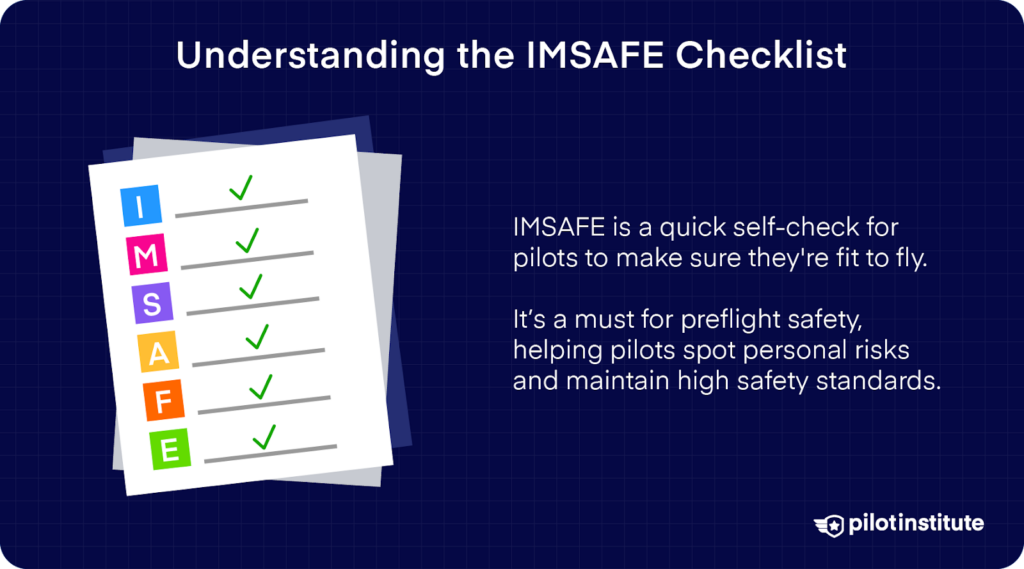
The IMSAFE checklist is a self-analysis tool designed for pilots to evaluate their fitness to fly. Standing for Illness, Medication, Stress, Alcohol, Fatigue, and Emotion. This acronym encapsulates the key factors that can impact a pilot’s ability to operate an aircraft safely.
This was developed to help pilots identify potential risks to their own safety and the safety of others, the IMSAFE checklist is an essential part of preflight tasks.
Preflight tasks are an important and cutting corners can lead to undesirable outcomes. By systematically going through each element of the IMSAFE checklist, pilots ask themselves if they are in the best possible condition to fly.
This tool is used by both general aviation and airline pilots. Its goal is to help them maintain high standards of flight safety.
The IMSAFE Acronym
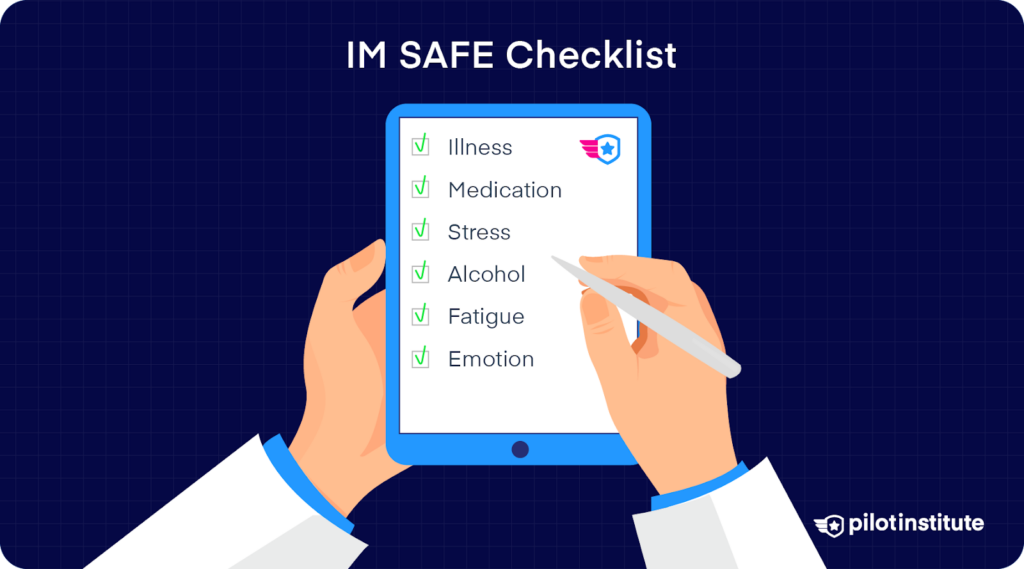
Here is what IMSAFE stands for:
I – Illness
M – Medication
S – Stress
A – Alcohol
F – Fatigue
E – Emotion
Let’s briefly dive into each part of the IMSAFE acronym so that you can implement it into your preflight checklist today and assess your ability as a pilot to fly safely.
I – Illness
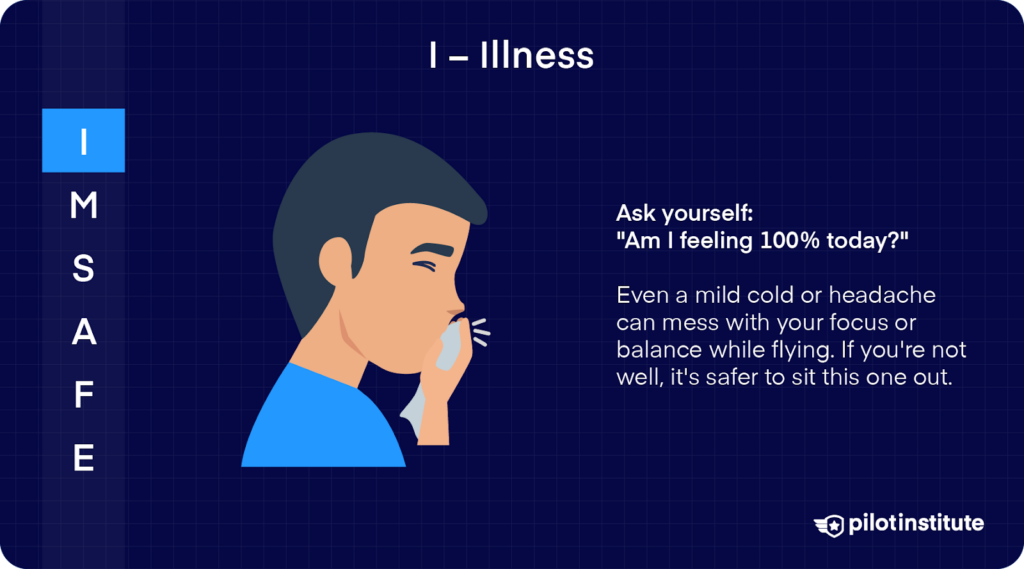
Illness (like many items in IMSAFE) is self-explanatory, with an important caveat.
In the traditional workplace, your usual call-in-sick illness, such as flu or food poisoning, will naturally also prevent you from flying.
But, when it comes to flying, you must be even more careful.
Why’s that?
Firstly, flying requires good concentration, decision-making, and the utilization of almost all of your senses. Even a light cough could prevent you from communicating on the radio, and a slight headache may be the seed that grows to be a poor decision.
Also, light illnesses may be significantly worsened because of the nature of the aviation environment. The most notable example is the sinuses.
Even a mild sinus infection can be excruciating during the flight due to the change in air pressure and may cause significant vertigo. Not the situation you’d want to find yourself in when you’re the only one flying.
If you’re not feeling 100%, the safest action is to delay the flight. If you’re unsure whether you’re fit to fly, consult an Aviation Medical Examiner (AME) or a doctor with experience in the aviation industry.
Additionally, be aware of the potential risks associated with over the counter medications, as some can impair your ability to fly safely. Always consult with an AME to understand the specific effects of any medication taken before flying.
M – Medication
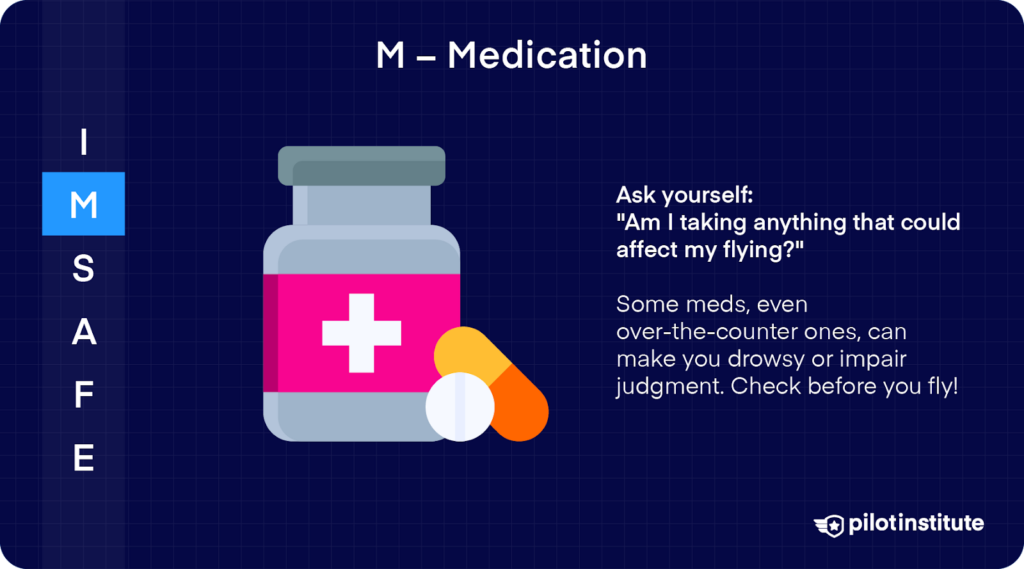
It is unwise to take medication without understanding the exact side effects you will experience. FAA regulations emphasize the importance of ensuring that pilots are aware of the legal requirements regarding medications and personal health checks before flying. Even a simple tablet to stop a headache may make you too drowsy to fly.
Always consult your doctor or Aviation Medical Examiner about the effects of any medication you take.
S – Stress
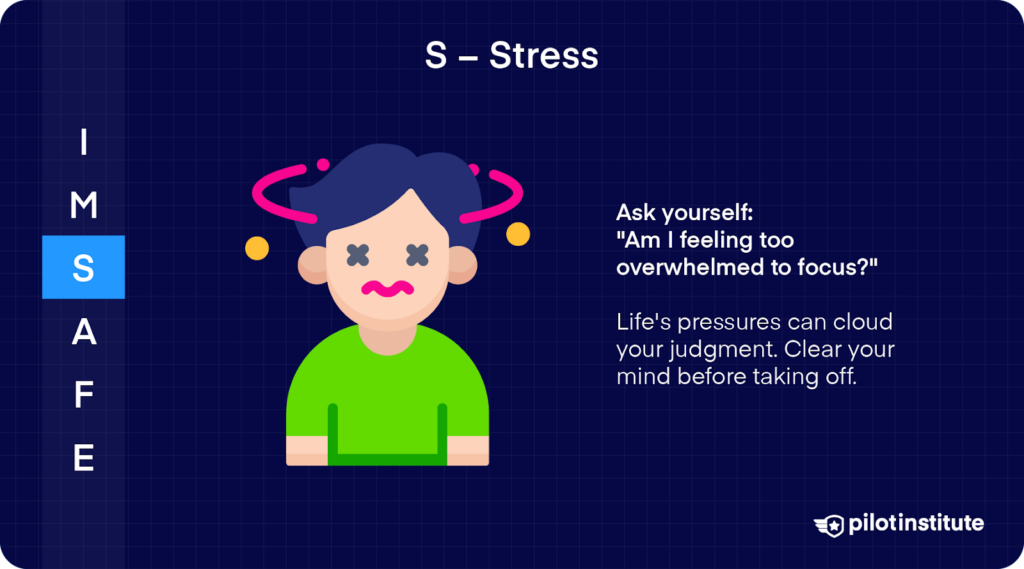
Psychological stress can impair your ability to make good decisions and react quickly to unexpected situations.
Most pilots are committed to their jobs, which can lead to overlooking personal fatigue and health assessments before flying, potentially compromising their safety and decision-making.
You have a responsibility to yourself and your passengers to perform to the best of your abilities when flying. If there are external factors affecting your stress levels, it is vital that you address them before flying.
Sometimes, the nature of the flight itself may be causing increased stress.
In cases where your stress level is elevated, identifying the increased stress level will allow you to recognize and take action to manage it.
A – Alcohol Consumption
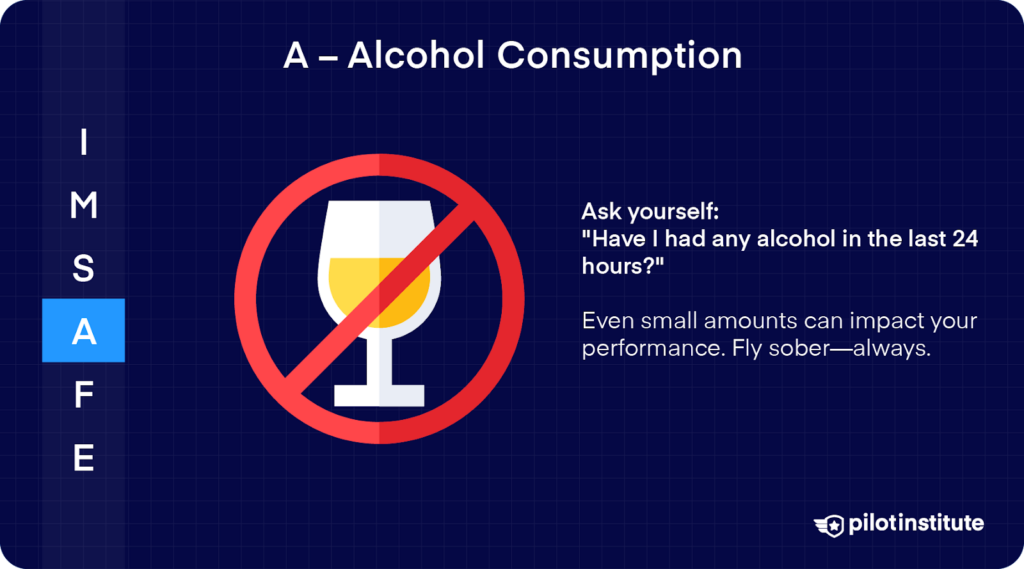
You should never fly while under the influence of alcohol. Not one drop.
A general rule of 8 hours from bottle to the throttle will serve you well, although many airlines have more stringent restrictions of 12 or 14 hours for their crew.
The Federal Aviation Regulations (FAR) state that you are not allowed to fly with a Blood Alcohol Concentration (BAC) of 0.04% or higher (the driving limit is double at 0.08%).
The FAA recommends waiting at least 24 hours after you have consumed alcohol before flying to ensure your fitness for flight and avoid the risks associated with alcohol impairment.
F – Fatigue
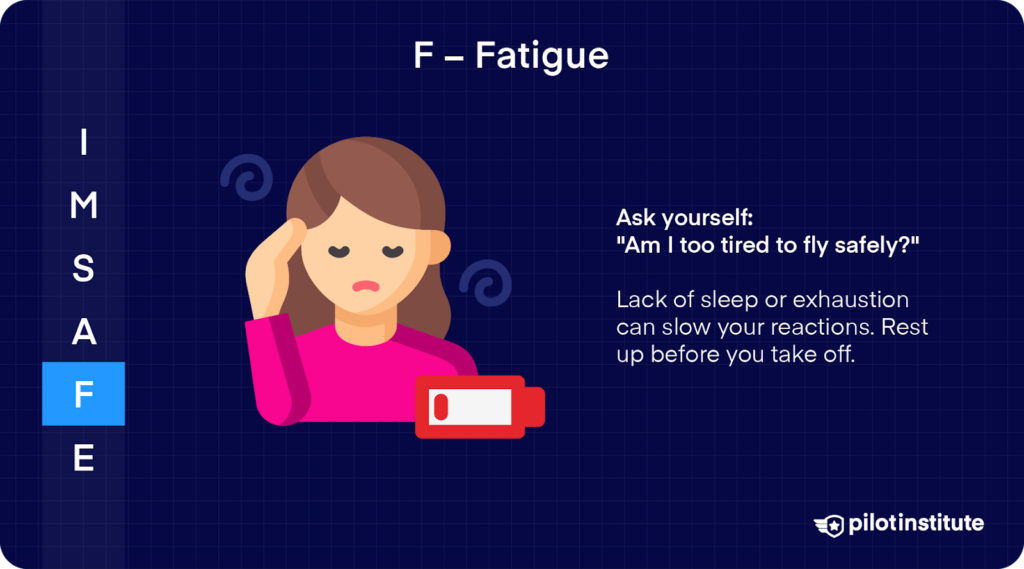
Fatigue is the silent killer, and has been a causal factor in numerous accidents.
Fatigue can impair your cognitive and physical abilities, making it more challenging to fly safely. From concentration to hand-eye coordination, fatigue can be a significant threat – in some cases, even more than alcohol.
Always ensure that you get high-quality sleep before flying, and avoid scheduling flights when you are likely to be tired. Flight training teaches pilots how to manage fatigue effectively, emphasizing safety and adherence to high standards.
E – Emotion (Everything Else)
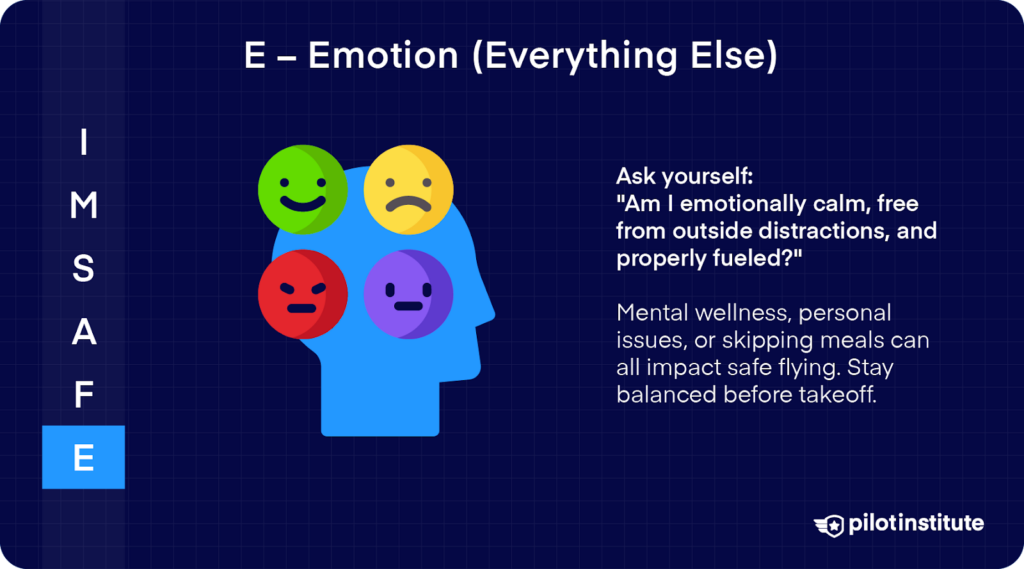
Emotional distress can also impair your ability to fly safely.
You must be emotionally stable when flying. If there are external factors significantly affecting your emotions, you should address them before flying.
The “E” also reminds pilots to consider external factors and eating. Outside distractions or skipping meals can equally impact focus and decision-making.
Conclusion
The IMSAFE acronym is a helpful tool for pilots to assess their physical and mental readiness before a flight. Each element of the acronym – Illness, Medication, Stress, Alcohol, Fatigue, and Emotion – plays a vital role in ensuring the safety of the flight.
Pilots can reduce the risk of accidents caused by pilot error by being aware of these factors and taking appropriate action.
Remember, the safety of the flight is only as good as its weakest link, and you should prioritize your own health and well-being to have a safe flight and protect the well-being of others.
